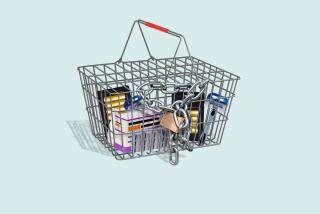Wal-Mart Stores Reach Out to Nursing Moms
- Share via
Teresa Lear, the mother of 21-month-old twins, said she’s found it a little easier to buy nursing products this time around than she did after her three older children were born. She emphasizes “a little.”
Despite growing public awareness of the value of breast-feeding, she said, she usually must order nursing items from a catalog or shop at specialty stores, such as Columbia Hospital for Women’s breast-feeding center in Washington, where she volunteers--options that are typically expensive and inconvenient.
Which makes her exactly the shopper Wal-Mart is setting its sights on. The nation’s largest retailer confirmed earlier this month that it is developing a section dedicated to products for nursing moms. The move is considered the first effort by a major retailer to sell to this market.
Wal-Mart Stores Inc. spokeswoman Jessica Moser said increased customer demand was one factor in the decision. But she added, “The main reason we’re offering the products is because we think it’s the right thing to do. We have worked with many professionals in the field and have become very aware that this is a healthy choice for women and babies.”
*
The company is shipping 33 breast-feeding products and 11 books to 950 of its 2,485 stores nationwide. The items--such as creams, pads and nursing nightwear--will be available by early February. A special section in infant departments will be labeled the Lansinoh Breast-Feeding Collection.
Resheda Hagen, founder of Lansinoh Laboratories Inc. in Oak Ridge, Tenn., and developer of a lanolin-based skin cream that purports to make breast-feeding less painful, sees Wal-Mart’s decision to sell her collection as a major marketing breakthrough. While maternity and baby stores routinely carry nursing items, Hagen said it took five years to persuade Wal-Mart to offer her signature Lansinoh cream. After seeing the success of that product and the size of the potential market, Wal-Mart came to Hagen to put together the section, she said.
Wal-Mart’s decision to set up a “destination point” for nursing mothers, Hagen said, “reflects that they’ve done their homework and they understand there’s a real opportunity here” to sell products and educate consumers.
Nursing was standard practice in America until homemade breast-milk substitutes--generally Karo syrup, water and condensed milk--came into vogue in the freewheeling 1920s, according to the La Leche League International in Chicago. Companies began marketing baby formula in the 1940s and 1950s.
*
Surveys by the Ross Products division of Abbott Laboratories show ups and downs since 1951 in the numbers of women who breast-fed while hospitalized. After dropping steadily through the ‘50s and ‘60s, the all-time low came in 1971, when the survey showed only 24.7% breast-fed in the hospital.
Now the number is at its highest ever: The 1998 Ross survey showed that 64.3% of mothers were initially nursing.
La Leche spokeswoman Mary Lofton credits a steady increase since 1990 to recent medical studies documenting nursing’s “enormous benefits” and to 1997 guidelines from the American Academy of Pediatrics recommending that mothers nurse for at least a year.
The league and Hagen say the big challenge is keeping mothers nursing after they leave the hospital: The drop-off is about 50% after two weeks. Hagen said Wal-Mart’s decision offers an opportunity to both encourage nursing and provide products that might ease the experience.
But Julie Edgerton, a lactation consultant at Columbia hospital’s breast-feeding center, warned that offering equipment without personalized advice on how to use it “could be dangerous.” Citing the high drop-off rate, Edgerton said, “The mothers just don’t hang in there because they don’t get the backup help they need.”
New mother Eveline Shum agreed that Columbia’s program of equipment plus consultants offers the best approach. But she called Wal-Mart’s move “a very positive sign” because it would show that breast-feeding has reached “populist America.”
More to Read
Inside the business of entertainment
The Wide Shot brings you news, analysis and insights on everything from streaming wars to production — and what it all means for the future.
You may occasionally receive promotional content from the Los Angeles Times.










